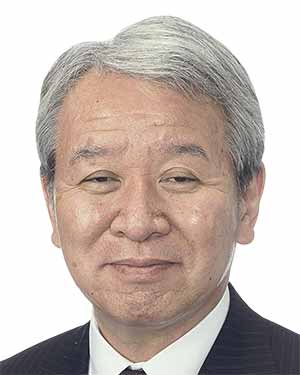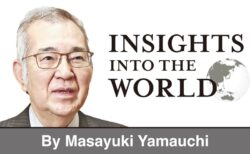11:00 JST, April 28, 2023
Prime Minister Fumio Kishida made a surprise visit to Ukraine on March 21. Apparently overshadowed by this, the visit he made to India before his tour of Kyiv did not draw that much media attention. Certainly, it was decisively important for the prime minister of Japan, this year’s chair of the Group of Seven major democracies, to go to Ukraine. Nonetheless, we should not forget that it is equally significant that the prime ministers of Japan and India confirmed during their recent summit in New Delhi that they would work together to preserve the international order based on the rule of law.
There are multiple diplomatic reasons to give importance to India.
First, India is this year’s chair of the Group of 20 major economies. The G20 is a forum for 19 major countries and the European Union to come together, with the participation of the United Nations and other international organizations as well, to consolidate opinions about how to address issues facing the international community.
The G20 was originally created as a forum of finance ministers and central bank governors of 19 countries and the EU in the wake of the Asian currency crisis of 1997-98. Their leaders also became involved following the global financial crisis of 2008.
The G20 economies’ collective gross domestic product accounts for more than 80% of the world economy. The forum greatly influences the evolution of the international order. It can be said that cooperation between the G7 and the G20 is now indispensable to resolve challenges in the international community. Japan served as the 2019 chair of the G20, playing a significant role in facilitating the group’s efforts to foster the free flow of trustworthy data and cope with marine plastic waste.
In a nutshell, Japan now has to work hand-in-hand with India in coordinating opinions from all relevant countries in the world to rebuild the international order that has been harmed by Russia’s invasion of Ukraine.
However, the G20 includes Russia and China as members. It is therefore considered difficult for the forum to agree on a uniform response to Russia’s invasion of Ukraine. When the U.N. General Assembly adopted a resolution on Feb. 23 calling for Moscow’s immediate withdrawal from the territory of Ukraine, among the G20 member countries, Russia voted against the resolution and China, South Africa and India abstained from the vote.
However, abstention does not necessarily imply support for Russia.
In early March, India hosted a meeting of G20 foreign ministers. It urged all participating countries to agree to reiterate in the chair’s outcome document parts of the G20 leaders declaration that they had adopted in November 2022 during a summit in Bali. The text in question partially read: “Most members strongly condemned the war in Ukraine and stressed it is causing immense human suffering and exacerbating existing fragilities in the global economy.”
Russia and China so staunchly opposed the Indian proposal that the foreign ministers meeting ended without adopting a joint statement. In its G20 chair’s summary, however, India dared to cite the abovementioned sections of the G20 leaders declaration — pertaining to the war in Ukraine — in the text and said in its footnote that they “were agreed to by all member countries except Russia and China.” India’s approach deserves more praise.
Need for lasting bilateral ties
There is a long-term reason for Japan to give weight to its relations with India, beyond a diplomatic tactic associated with its 2023 chairmanship of the G7. It is because India will almost certainly emerge as a superpower in the near future.
India is expected to overtake China as the world’s most populous country by the middle of the year. In terms of gross domestic product, it became the world’s fifth largest economy in 2021, surpassing the United Kingdom that once placed the Asian country under colonial rule. Further, India’s economic growth in 2023 is projected to outpace China’s, as it did in 2022. Some estimates suggest that in terms of GDP, India will likely move ahead of Japan as early as 2027 to become the world’s third biggest economic power.
Of course, India is not without domestic issues. The country still has a high poverty rate with serious income inequality. It faces a plethora of development issues, such as air pollution and a vulnerable health care system.
India’s political landscape has certain aspects that are hardly consistent with idealistic democracy. The V-Dem Institute, a Swedish organization that measures “levels of democracy” worldwide, classifies India as not a full democracy, as it is one of the countries that have turned into “electoral autocracies” despite holding elections.
That said, it is wrong to equate India with China and Russia. In the Indian Parliament, ruling and opposition party members engage in lively debates. It has the potential to become a democratic superpower in the long term and lead the free and open global order.
Japan’s decades-long amicable relationship with India will likely turn out to be a huge asset for it in the future. When Japan endured the postwar years as a defeated nation, India was benevolent to it. Since the outset of the 21st century, Japan and India have maintained notably close relations. Japan has been globally hailed for devising the concept of a “free and open Indo-Pacific.” It was the Indian Parliament where then Prime Minister Shinzo Abe delivered an address under the title of “Confluence of the Two Seas” — the Indian Ocean and the Pacific Ocean — in 2007, in which he introduced the origin of the new geopolitical concept.
From that year, the Japanese Maritime Self-Defense Force began joining the Indian and U.S. naval forces in the annual Malabar exercise. The Quad, an international framework formed by Japan, the United States, Australia and India has also rapidly become indispensable for regional stability.
Japan has actively provided India with official development assistance. In 1958, India became the recipient of Japan’s first yen-denominated official loan. In the 21st century, India has been the largest recipient of Japanese ODA.
Japan has financed most of the construction of the Delhi Metro network, which now extends a total of about 390 kilometers connecting the Indian capital and its suburban districts, through yen loans. The network has introduced Japanese-style women-only cars and reserved seats for disabled and elderly persons. A high-speed rail corridor that will connect Mumbai, the second largest Indian city, and Ahmedabad in about two hours is under construction with yen loans from Japan.
National efforts essential
India highly appreciates such attempts by Japan. Still, there are concerns about whether Japan-India relations will remain rock-solid once India finally becomes a superpower.
The first point of concern is that private businesses in Japan are somewhat unenthusiastic about entering the Indian market. As a result, the number of Japanese companies operating in India has been almost unchanged in recent years. In India, state governments have strong administrative authority, making regulatory regimes extremely complicated, while the central government’s bureaucracy remains rigid. These factors impede Japanese companies from operating in India. The governments of Japan and India should make efforts to improve the situation.
The second point of concern is the scarcity of people-to-people exchanges between Japan and India. In 2019, only about 240,000 Japanese people visited India, compared with 2.68 million Japanese traveling to China.
It is even more shocking to know that the number of Indians studying in Japan is quite small. As of the end of June 2022, Japan hosted only 1,692 Indian students, compared with more than 110,000 Chinese students. The University of Tokyo hosted 87 students from India as of May 2022, compared with 3,036 from China.

Akihiko Tanaka
Tanaka is president of the Japan International Cooperation Agency (JICA), a post he took up in April 2022 for the second time after his first stint in 2012-15. He served as president of the Tokyo-based National Graduate Institute for Policy Studies (GRIPS) from 2017 to March 2022. Previously, he was vice president of the University of Tokyo from 2009 to 2012.
The original article in Japanese appeared in the April 23 issue of The Yomiuri Shimbun.
Top Articles in Editorial & Columns
-

Riku-Ryu Pair Wins Gold Medal: Their Strong Bond Leads to Major Comeback Victory
-

Reciprocal Tariffs Ruled Illegal: Judiciary Would Not Tolerate President’s High-Handed Approach
-

China Provoked Takaichi into Risky Move of Dissolving House of Representatives, But It’s a Gamble She Just Might Win
-

Japan’s Plan for Investment in U.S.: Aim for Mutual Development by Ensuring Profitability
-

Flu Cases Surging Again: Infection Can Also Be Prevented by Humidifying Indoor Spaces
JN ACCESS RANKING
-

Producer Behind Pop Group XG Arrested for Cocaine Possession
-

Japan PM Takaichi’s Cabinet Resigns en Masse
-

Man Infected with Measles Reportedly Dined at Restaurant in Tokyo Station
-

Israeli Ambassador to Japan Speaks about Japan’s Role in the Reconstruction of Gaza
-

Videos Plagiarized, Reposted with False Subtitles Claiming ‘Ryukyu Belongs to China’; Anti-China False Information Also Posted in Japan
























